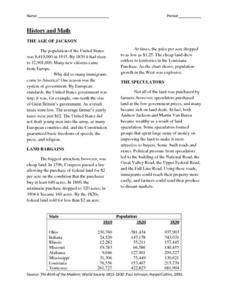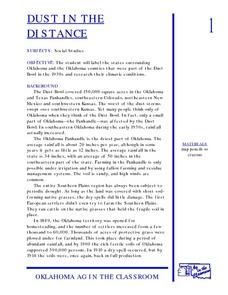Curated OER
Feral Cats
In this geography activity, students identify the feral cats of Australia. They read an excerpt and respond to the three questions that follow. Students also imagine that they are a part of scientific team that has been set up to deal...
Curated OER
Life on Plymouth Plantation
Third graders research life of Plymouth Plantation and write letters about life there home. In this Plymouth life lesson, 3rd graders complete a webquest as they gather information about the journey to America on the Mayflower and the...
Curated OER
Learning to Respect Each Other
Discover how important Martin Luther King Jr. is to our society. In this civil rights lesson, investigate how Dr. King was an advocate for nonviolence and how he fought for civil rights for all Americans. Read and analyze Dr. King's "I...
Curated OER
Worm Watching
Learners examine the role earthworms play in building soils. They discuss worms and what they do with soil, make predictions and draw pictures, and observe their worms in soil over a two week period.
Curated OER
Colonial North America
Showcase the religion, conflicts, daily life, and politics of Colonial North America. A very well-done presentation highlights all the major colonial groups, social norms, demographics, and political struggles of the time. Perfect for an...
Curated OER
Games Children Play
Help your middle schoolers recognize the similarities and differences between the games they play and those played by pioneer children. Using the Internet, they research a game of their choice and discover how it has evolved over time....
K12 Reader
Conflict Over North American Lands
Readers are introduced to some of the conflicts that arose over land and resources in the Americas in a two-part cross-curricular comprehension worksheet that asks kids to study the article and then to use information provided to respond...
K12 Reader
The Apprentice System
Readers are asked to identify the central idea and two supporting details that develop this main idea in an article about the apprentice system popular in colonial America.
K12 Reader
Apprentice System
As a reading comprehension exercise, kids examine a short article on the apprentice system, and then use information found in the text to respond to a series of comprehension questions.
Bismarck Public Schools
History & Math of the 1830s
Using this interdisciplinary worksheet, your young historians will have the opportunity to practice their math skills while learning about the drastic population increase in the United States during the presidency of Andrew Jackson....
Berkshire Museum
The Three Life-Giving Sisters: Plant Cultivation and Mohican Innovation
Children gain first-hand experience with Native American agriculture while investigating the life cycle of plants with this engaging experiment. Focusing on what the natives called the Three Sisters - corn, beans, and squash - young...
PBS
Latino Americans: Timeline of Important Dates
From 1500-2000, an interactive timeline details important events related to Latino Americans. Next, to each date are small, yet informative blurbs—some of which include videos.
Curated OER
More Than Tipis and Feathers
Fourth graders research Native American People of the plains, the forest, the northwest coast and the desert. They compare how their lives were similar and how they were different. They make a model of one type of dwelling.
Curated OER
Revolutionary War: The Battle of Oriskany
Students evaluate the decisions several New Yorkers made about which side to support during the Revolutionary War and analyze the Battle of Oriskany to determine whether the Tories or the Rebels won the battle.
Curated OER
Native American Culture
Young scholars research Native American culture. In this Native Americans lesson, students read the folk tale, The Strongest One and identify the natural resources in the poem. Young scholars participate in a discussion of how Native...
Curated OER
Dust In The Distance
Students are introduced to the events of the Dust Bowl. Using a map, they locate and label all of the states surrounding and including Oklahoma. After also labeling the counties in Oklahoma, they use the internet to research the...
Curated OER
Native Americans 1700s-1800s
Eighth graders investigate and explain major Native American groups, events, individuals and conflicts from the 1700s through the 1800s in the early American colonies and the United States.
Curated OER
THE FABLE OF THE FAINTING GOATS
Students practice telling time while reading a story about a fainting goat. They write their own story about a fainting goat. Students write letters to the International Fainting Goat Association, asking for more information about...
Curated OER
Fable of the Fainting Goat
Young scholars read a story. In this telling time lesson, students complete a worksheet where they must practice their knowledge of telling time. Young scholars read a fable and answer time questions as they read.
Curated OER
We Are Colony! Settlement Design
Middle schoolers explore government systems. In this colonial America lesson, students consider colonial settlement needs as they design settlements that can sustain themselves and meet the needs of colonists.
Curated OER
Lesson 1: Culture and Resource Use
Students research an aspect of Wabanaki culture that has persisted in Maine throughout the years. They write a conversation between a Wabanaki person and an English person that shows the different cultures and negotiates a solution to a...
Curated OER
Time Line of the Land
Students use the internet to discover how agriculture has changed over time. In groups, they research any terms they are unfamiliar with and present their findings to the class. They are assigned one section of the timeline and...
Curated OER
Caribbean Music-- An Introduction
In this music activity, students investigate the history of music and the musical style of the Caribbean islands. Students read a 1 page information sheet about the region and its music. Students answer 8 questions.
Curated OER
Introduction to Caribbean Music
In this Caribbean music worksheet, 8th graders read about the cultural background of the Caribbean nations and about the characteristics of the music. They examine call and response, ostinato, and syncopated rhythms. They answer 8...

























